|
|
|
Sort Order |
|
|
|
Items / Page
|
|
|
|
|
|
|
| Srl | Item |
| 1 |
ID:
141461
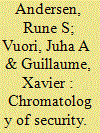

|
|
|
|
|
| Summary/Abstract |
The agenda of this article is to highlight how security becomes intelligible, is enacted, contested and (re)appropriated in part through colour use. Even though colours are a natural phenomenon, their meanings are societal products, and part of our constructed visibilities. These can be investigated through chromatology, the study of colour in relation to people. We illustrate this by applying multimodal social semiotics to view highly securitized sites, those of concentration and enemy-combatant camps. We show that the colour uses instituted to classify and govern prisoners not only structure the inmates socially, but also become vehicles for resisting the security discourses associated with them. The aim of the article is to highlight how security and international relations are intersemiotic relations, and to open up the study of security to an expanded range of semiotic modalities and methods of inquiry.
|
|
|
|
|
|
|
|
|
|
|
|
|
|
|
|
| 2 |
ID:
141780
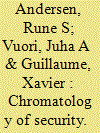

|
|
|
|
|
| Summary/Abstract |
The agenda of this article is to highlight how security becomes intelligible, is enacted, contested and (re)appropriated in part through colour use. Even though colours are a natural phenomenon, their meanings are societal products, and part of our constructed visibilities. These can be investigated through chromatology, the study of colour in relation to people. We illustrate this by applying multimodal social semiotics to view highly securitized sites, those of concentration and enemy-combatant camps. We show that the colour uses instituted to classify and govern prisoners not only structure the inmates socially, but also become vehicles for resisting the security discourses associated with them. The aim of the article is to highlight how security and international relations are intersemiotic relations, and to open up the study of security to an expanded range of semiotic modalities and methods of inquiry.
|
|
|
|
|
|
|
|
|
|
|
|
|
|
|
|
| 3 |
ID:
141778
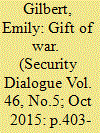

|
|
|
|
|
| Summary/Abstract |
As part of the counterinsurgency initiatives in Afghanistan and Iraq, military forces have been making payments to civilians in cases of ‘inadvertent’ injury, death and/or damage to property. There are no legal norms governing civilian compensation in war. Rather, military payments are seen as a way to help ‘win’ the hearts and minds of the population. This article examines this turn to military payments, with a focus on US practices and the implications for our understanding of contemporary changes to warfare. I suggest that while monetary payments can alleviate short-term economic need, the lack of legal liability is problematic as it may help amplify the impunity of warring soldiers. The article begins with an overview of the bureaucratic ways in which monetary values are attributed to death and injury. It then turns to consider how military payments reinforce the notion of ‘collateral damage’ that is legitimized in international humanitarian law. Finally, I draw upon theories of the gift, and of the gift of war, to interrogate the affective register in which military payments are made, inserted as they are in narratives of sympathy and condolence that bind the giver and receiver in relations of indebtedness and dependence.
|
|
|
|
|
|
|
|
|
|
|
|
|
|
|
|
| 4 |
ID:
141459


|
|
|
|
|
| Summary/Abstract |
As part of the counterinsurgency initiatives in Afghanistan and Iraq, military forces have been making payments to civilians in cases of ‘inadvertent’ injury, death and/or damage to property. There are no legal norms governing civilian compensation in war. Rather, military payments are seen as a way to help ‘win’ the hearts and minds of the population. This article examines this turn to military payments, with a focus on US practices and the implications for our understanding of contemporary changes to warfare. I suggest that while monetary payments can alleviate short-term economic need, the lack of legal liability is problematic as it may help amplify the impunity of warring soldiers. The article begins with an overview of the bureaucratic ways in which monetary values are attributed to death and injury. It then turns to consider how military payments reinforce the notion of ‘collateral damage’ that is legitimized in international humanitarian law. Finally, I draw upon theories of the gift, and of the gift of war, to interrogate the affective register in which military payments are made, inserted as they are in narratives of sympathy and condolence that bind the giver and receiver in relations of indebtedness and dependence.
|
|
|
|
|
|
|
|
|
|
|
|
|
|
|
|
| 5 |
ID:
141460
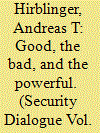

|
|
|
|
|
| Summary/Abstract |
This article argues for a reflexive perspective on the ‘local’ in peacebuilding. While it is now widely acknowledged that anything local is complex, unstable, and relational, scholars continue to make truth claims about local actors and practices. This leads to an incomplete account of peacebuilding, as it conceals the powerful effects of representation, which shape our perspective on the local. We argue that the local is both used and produced through practices of representation, and that these representations serve to define what good peacebuilding entails. We consequently suggest a perspective on perspectives, which focuses on how representations of the local relate to political agendas in peacebuilding, and which can account for the effects of choosing one mode of representation over another. Through case studies from Burundi and South Sudan, we show that representations of the local are conflictingly produced by scholars, practitioners, and government officials, telling about the true, the good, and the bad local, empowering some and disempowering other actors, institutions, and practices. These dynamics have tangible effects on peace, conflict, and (in)security.
|
|
|
|
|
|
|
|
|
|
|
|
|
|
|
|
| 6 |
ID:
141779
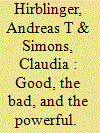

|
|
|
|
|
| Summary/Abstract |
This article argues for a reflexive perspective on the ‘local’ in peacebuilding. While it is now widely acknowledged that anything local is complex, unstable, and relational, scholars continue to make truth claims about local actors and practices. This leads to an incomplete account of peacebuilding, as it conceals the powerful effects of representation, which shape our perspective on the local. We argue that the local is both used and produced through practices of representation, and that these representations serve to define what good peacebuilding entails. We consequently suggest a perspective on perspectives, which focuses on how representations of the local relate to political agendas in peacebuilding, and which can account for the effects of choosing one mode of representation over another. Through case studies from Burundi and South Sudan, we show that representations of the local are conflictingly produced by scholars, practitioners, and government officials, telling about the true, the good, and the bad local, empowering some and disempowering other actors, institutions, and practices. These dynamics have tangible effects on peace, conflict, and (in)security.
|
|
|
|
|
|
|
|
|
|
|
|
|
|
|
|
| 7 |
ID:
141781


|
|
|
|
|
| Summary/Abstract |
Despite a growing interest in the role of emotions in world politics, the relationship between emotion and securitization remains unclear. This article shows that persistent, if sporadic, references to fear and emotion in securitization studies remain largely untheorized and fall outside conventional linguistic and sociological ontologies. The tendency to discuss emotion but deny it ontological status has left securitization theory incoherent. This article offers a theoretical reconstruction of securitization where emotion, specifically collective fears, serve as the locus of an audience’s judgment for the practice of securitization. Yet rather than simply accepting that fear facilitates securitizing moves, the article draws on appraisal theory from psychology to argue that collective fear appraisals are often fragile cultural constructs. The generation of these emotional appraisals is often constrained by the limited symbolic resources of the local security imaginary and how agents contest and employ these resources. When the capacity to generate collective fears is constrained, so too is the practice of securitization. An empirical discussion of threat images in US foreign policy is used to explore these constraints. The tendency for securitizing moves to be interpreted as comic underscores the precariousness of social practices seeking to elicit particular collective emotions.
|
|
|
|
|
|
|
|
|
|
|
|
|
|
|
|
| 8 |
ID:
141462


|
|
|
|
|
| Summary/Abstract |
Despite a growing interest in the role of emotions in world politics, the relationship between emotion and securitization remains unclear. This article shows that persistent, if sporadic, references to fear and emotion in securitization studies remain largely untheorized and fall outside conventional linguistic and sociological ontologies. The tendency to discuss emotion but deny it ontological status has left securitization theory incoherent. This article offers a theoretical reconstruction of securitization where emotion, specifically collective fears, serve as the locus of an audience’s judgment for the practice of securitization. Yet rather than simply accepting that fear facilitates securitizing moves, the article draws on appraisal theory from psychology to argue that collective fear appraisals are often fragile cultural constructs. The generation of these emotional appraisals is often constrained by the limited symbolic resources of the local security imaginary and how agents contest and employ these resources. When the capacity to generate collective fears is constrained, so too is the practice of securitization. An empirical discussion of threat images in US foreign policy is used to explore these constraints. The tendency for securitizing moves to be interpreted as comic underscores the precariousness of social practices seeking to elicit particular collective emotions.
|
|
|
|
|
|
|
|
|
|
|
|
|
|
|
|
| 9 |
ID:
141463


|
|
|
|
|
| Summary/Abstract |
Critical scholarship on the camp tends to focus on the institution’s historical role in producing forms of social exclusion often by linking the emergence of the camp to the creation of abstract political divisions such as citizenship and nationality. While this approach has unquestionable value, it overemphasizes the importance of social constructions in the history and development of the camp. This article calls for a re-examination of the material elements composing camp spaces by offering attention to how non-human entities and processes contribute to the development of practices of confinement, security and governance. Drawing on the work of Manuel DeLanda, Gilles Deleuze, and Félix Guattari, this article develops an outline of the camp as a material assemblage and examines how the camp emerges from the interaction of barbed wire, war, and the rise of motorized transport. This process of historical emergence helps to explain the elastic and transient dimensions of the camp as constitutive of a new form of fluid political control. Moreover, the article claims that attending to the materiality of the camp helps to explain the expanding role that camps will play in the future of political governance.
|
|
|
|
|
|
|
|
|
|
|
|
|
|
|
|
| 10 |
ID:
141782


|
|
|
|
|
| Summary/Abstract |
Critical scholarship on the camp tends to focus on the institution’s historical role in producing forms of social exclusion often by linking the emergence of the camp to the creation of abstract political divisions such as citizenship and nationality. While this approach has unquestionable value, it overemphasizes the importance of social constructions in the history and development of the camp. This article calls for a re-examination of the material elements composing camp spaces by offering attention to how non-human entities and processes contribute to the development of practices of confinement, security and governance. Drawing on the work of Manuel DeLanda, Gilles Deleuze, and Félix Guattari, this article develops an outline of the camp as a material assemblage and examines how the camp emerges from the interaction of barbed wire, war, and the rise of motorized transport. This process of historical emergence helps to explain the elastic and transient dimensions of the camp as constitutive of a new form of fluid political control. Moreover, the article claims that attending to the materiality of the camp helps to explain the expanding role that camps will play in the future of political governance.
|
|
|
|
|
|
|
|
|
|
|
|
|
|
|
|
|
|
|
|
|